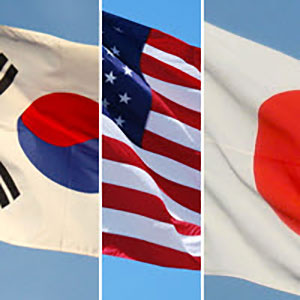Allied Energy Security
The Role of U.S. Oil and LNG Exports in U.S. Relations with Japan and South Korea
This paper provides an overview of Japan’s and South Korea’s energy vulnerabilities, assesses the role of U.S. oil and liquefied natural gas (LNG) exports in strengthening both countries’ energy security, and offers proposals for a trilateral energy security partnership.
EXECUTIVE SUMMARY
MAIN ARGUMENT
Japan and the Republic of Korea (ROK) are overwhelmingly dependent on imported oil (and to a lesser extent LNG) from the Middle East and have an equally high dependence on vulnerable sea lines of communication. U.S. oil and LNG exports have the potential to enhance Japan’s and South Korea’s energy security by increasing supply diversification and providing alternative and more secure supply routes. More importantly, U.S. LNG is free of destination restrictions and de-linked from oil-indexed pricing, making it indispensable to Japan’s strategy to shift toward a more flexible LNG procurement model as well as establish an LNG trading hub in Asia. The proposed trilateral energy security partnership is not a zero-sum game and therefore would contribute to Asia’s overall regional energy security and environmentally sustainable economic development, while also strengthening the U.S. security alliances with Japan and the ROK.
POLICY IMPLICATIONS
- To mitigate Japan’s and South Korea’s exceptionally high energy security risks, the U.S., Japan, and South Korea should establish a trilateral energy security commission with a working group tasked with promoting the joint development and procurement of U.S. oil and LNG exports that will increase supply diversification while providing alternative and more secure supply routes.
- The proposed working group should engage with the private sector to identify and prioritize areas for trilateral cooperation that take advantage of the structural evolution occurring in global oil and LNG markets, particularly the shift toward a more liquid and flexible LNG market in Asia with an eye toward supporting Japan’s efforts to establish a regional LNG trading hub and benchmark.
- The working group should also closely cooperate with the private sector to finance and develop high-quality natural gas infrastructure and gas-fired power generation in developing Asia and beyond in order to alleviate energy poverty and mitigate dependence on coal.
Jeremy Maxie is an Associate at Strategika Group Asia Pacific.
Tatsuo Masuda is Visiting Professor at the Nagoya University of Commerce and Business Graduate School and Chairman of FairCourt Capital in London.



